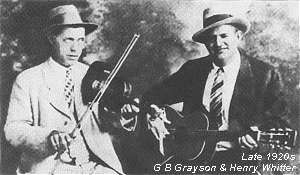 As a young man he moved to adjacent Johnson County, Tennessee, and settled in the town of Laurel Bloomery, earning a meagre living by fiddling and singing on street corners, at parties, tent shows and social events.
As a young man he moved to adjacent Johnson County, Tennessee, and settled in the town of Laurel Bloomery, earning a meagre living by fiddling and singing on street corners, at parties, tent shows and social events.
In North Carolina's far northwestern corner is a rolling plateau separated from the rest of the state by the abrupt slopes of the Blue Ridge Mountains. The eastern wall of these mountains was not pierced by roads until the turn of the twentieth century, and these were trails of red clay that were barely passable. In 1799 the North Carolina General Assembly designated this high country as Ashe County, named for Samuel Ashe, Revolutionary War patriot and three-term governor of the state. In later years, two additional counties, Watauga and Allegheny, were formed from portions of Ashe. Isolated in their mountain fortress, these counties became known as the 'Lost Provinces'. Although they were a part of North Carolina, their trade and transportation were linked with neighboring Tennessee and Virginia, which were more easily accessed.
The Cherokees, Shawnees, and Creeks had hunted this territory for centuries, but the first recorded visit by white men occurred in 1752 when a band of six explorers, led by Augustus Spangenberg, arrived after a harrowing ascent of the Blue Ridge. Spangenberg, a Moravian bishop from Bethlehem, Pennsylvania, had been charged by church elders to find favorable land for a new settlement, and thus his expedition to Carolina. Diligently recording his progress, the bishop made the following entry in his diary for December 2nd:
We have reached here after a hard journey over very high, terrible mountains and cliffs. Part of the way we climbed on hands and knees, dragging after us the loads we had taken from the backs of horses, for had we not unsaddled them they would have fallen backward down the mountain indeed this did happen once; part of the way we led the horses which were trembling like a leaf. When we reached the top we saw mountains to the right, to the left, before and behind us, rising like great waves in a storm.Spangenberg's diary also described the natural beauty and resources of the land that would later be Ashe, noting especially the fertile soil, wild game, and abundant pasture. The Moravians moved on, but other settlers began flowing into the region by the end of the 18th century. Some found their way through the treacherous mountain passes of the Blue Ridge, others came over the Stone Mountains from Tennessee but most traveled along the 'Great Wagon Road' through the Shenandoah Valley southward into North Carolina. These immigrants were mostly English, Scotch-Irish and Germans, who brought with them the culture and music of their homelands, traditions that gradually found fresh expression in the rugged Ashe territory. Life in the Lost Provinces was strenuous, and early homesteaders were by necessity tough, hard-working and self sufficient. Winters were harsh and transportation was severely limited; there was no industry, and even rudimentary agricultural implements were rare in the early days. Doctors were few and mail service was practically nonexistent, but such hardships were mitigated by the lure of adventure and the promise of independence.
Few areas could compare with the Lost Provinces in the abundance of homegrown musical talent. Fiddlers in each isolated community provided music for dances and socials in the days before records and radio. The music was vital entertainment, a welcome diversion from arduous daily labor. Gradually new songs and tunes were introduced by travelers and incoming settlers, and other instruments began to supplement the fiddle. By the late l9th century, the banjo, of African origin, had become commonplace in the Lost Provinces, though very few blacks actually lived in the region. Guitars also found a place among mountain musicians, and stringbands began to replace the older solo fiddlers. The piano too, entered mountain regions, but its role was limited due to its greater cost and relative immobility.
During the 1920s, phonograph companies began to develop markets for country music, and no region was deemed too remote for talent scouts. Between 1927 and 1931, musicians from the Lost Provinces were recruited to make records at various locations in the South where record companies had established provisional studios. Many of these musicians were of the younger generation, some still teenagers, and eager to try out the new medium. Even so, much of their music possessed an introspective, brooding quality that lingered from the years of isolation that had long characterized the Lost Provinces. It was a time when the old and the new combined to produce a unique sound, and today we are fortunate that this music was captured on disc.
One of the older fiddlers to record was Gilliam Banmon Grayson. Born in 1887 and raised in the secluded northwest corner of Ashe County, he suffered blindness from an early age. Known professionally as G B Grayson, he was usually called Banmon by friends and family. He came from a respected family including an uncle, Major James Grayson, who organized volunteer regiments of Union sympathizers from North Carolina and Tennessee during the Civil War and led the 'Mountain Yankees' in battle against the Confederacy. Banmon Grayson's career options were limited by his blindness, but he was able to soak up the rich musical heritage of the Lost Provinces.  As a young man he moved to adjacent Johnson County, Tennessee, and settled in the town of Laurel Bloomery, earning a meagre living by fiddling and singing on street corners, at parties, tent shows and social events.
As a young man he moved to adjacent Johnson County, Tennessee, and settled in the town of Laurel Bloomery, earning a meagre living by fiddling and singing on street corners, at parties, tent shows and social events.
In the summer of 1927, while competing at a fiddler's contest in nearby Mountain City, Grayson met Henry Whitter, a musician who would have a profound impact on his career. Whitter, a native of Fries, in Grayson County, Virginia, was already a four-year veteran of the recording studio. His records for the Okeh and Victor labels included harmonica novelties as well as songs with guitar, including the well-known The Wreck on the Southern Old 97. Whitter recognized in Grayson a superior talent, and suggested a partnership that might benefit them both. By the fall of 1927, Whitter had arranged recording dates with both Gennett in New York City and Victor in Atlanta, sessions that introduced Grayson's expressive singing and fiddling to a wider audience, with Whitter providing guitar backup and occasional vocal interjections. More sessions followed, and over a three year period Grayson and Whitter recorded nearly 40 songs.
Train 45, Grayson's adaptation of the old banjo tune Reuben's Train, has since become a fiddlers classic, and his rendition of the Irish ballad Handsome Molly remains the definitive version. Other memorable songs recorded by Grayson and Whitter include I've Always Been a Rambler, a mournful ballad of lost love, and Short Life of Trouble, an old folk song that could easily be applied to Grayson himself: he died tragically in 1930 in a road accident near Damascus, Virginia. Though his career was cut short, Banmon Grayson's influence as a fiddler was widespread, and continues today.
A younger generation of Ashe County fiddlers was represented by Frank Blevins. Born in 1911 and raised along little Horse Creek, he was the youngest of eight children. 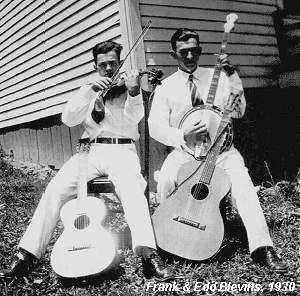 Frank's father, Avery Blevins, was an accomplished fiddler who exposed his children to the traditional music of the Lost Provinces. By the age of six Frank was teaching himself to play his father's fiddle, and soon developed a distinctive style of his own. A lengthy convalescence from a hunting accident at age twelve provided time to hone his skills. Frank's constant companion was his older brother Edd Blevins, who played guitar. The two brothers built a repertoire of old-time mountain songs and tunes, playing at local dances, corn shuckings, and school events. They were soon joined by a neighbor, Fred Miller, who played banjo in a style inspired by the now legendary Charlie Poole.
Frank's father, Avery Blevins, was an accomplished fiddler who exposed his children to the traditional music of the Lost Provinces. By the age of six Frank was teaching himself to play his father's fiddle, and soon developed a distinctive style of his own. A lengthy convalescence from a hunting accident at age twelve provided time to hone his skills. Frank's constant companion was his older brother Edd Blevins, who played guitar. The two brothers built a repertoire of old-time mountain songs and tunes, playing at local dances, corn shuckings, and school events. They were soon joined by a neighbor, Fred Miller, who played banjo in a style inspired by the now legendary Charlie Poole.
In 1927 the trio auditioned for a talent scout from the Columbia Phonograph Company and in November of that year traveled to Atlanta to make records under the supervision of Frank B Walker. A name was created on the spot for the band: Frank Blevins and His Tar Heel Rattlers. Only 16 years old at the time, Frank led the band with spirited fiddling and singing that belied his age. Inspired by a few shots of Georgia corn liquor, they first recorded the traditional mountain dance tune Sally Ann, a rendition with such verve and passion that it rivals any other. 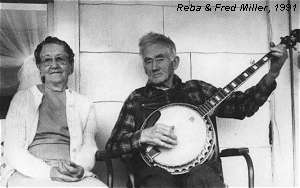 Next they performed I've Got No Honey Babe Now, a song that shares some lyrics with the old banjo piece Honey Babe, but with a different melody. Old Aunt Betsy was a Frank Blevins original, combining a simple theme with exuberant delivery. The session ended with a second traditional dance tune, Fly Around my Pretty Little Miss.
Next they performed I've Got No Honey Babe Now, a song that shares some lyrics with the old banjo piece Honey Babe, but with a different melody. Old Aunt Betsy was a Frank Blevins original, combining a simple theme with exuberant delivery. The session ended with a second traditional dance tune, Fly Around my Pretty Little Miss.
Following their recording session, the Tar Heel Rattlers traveled to West Virginia, touring the coal camps, earning a few dollars playing for workers who were eager for entertainment. In Beckley, West Virginia, the band got a chance to hear their first Columbia release, as Fred Miller recalled:
We knew our record had come out and we wanted to get one. I went into Beckley with Frank and Edd to the music store there. We went in and asked the woman who ran the store if she had those records.The Tar Heel Rattlers returned to Atlanta on April 17, 1928 for a second recording session that yielded two further sides on the Columbia label: Don't Get trouble in Your Mind, a folk song using a tune similar to Mollie and Tenbrooks,She said, "There should be a bunch on the train when it comes in, should be about thirty minutes."
So we messed around the music store. And she didn't know we were musicioners, that woman didn't. Pretty soon she went and got them records and come back. She put on that Old Aunt Betsy, that was the first one she played.
She said, "Boy, that fellow can really play a fiddle." And Frank said, "Oh, he ain't so hot. If I had my old fiddle I could play as good as he could." She said, "You're kidding me, you can't play a fiddle." He said, "I can, but I ain't got my fiddle." She said, "I got every kind of stringed instrument you can think of back there in the back room."
She went and got a guitar, a banjo and a fiddle. The three of us we went and tuned up a little bit around the stove. Then Frank started to saw away! He laughed and throwed back his head and went to singing Old Aunt Betsy and stomping his foot. When he quit, the woman said, "How on earth did you learn that record? I t just came out!"
And Frank said, "Lady, I didn't learn it, I made it!"
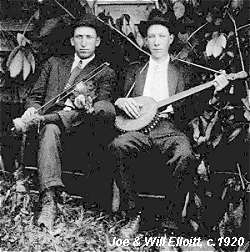 the well-known horserace ballad of the late 19th century; and Nine Pound Hammer, a work song associated with both mining and railroads. Once again Frank Blevins gave the songs his distinctive imprint, applying youthful energy to age-old subjects.
the well-known horserace ballad of the late 19th century; and Nine Pound Hammer, a work song associated with both mining and railroads. Once again Frank Blevins gave the songs his distinctive imprint, applying youthful energy to age-old subjects.
Following the Tar Heel Rattlers in the studio on April 17th was another Ashe County band that had traveled to Atlanta hoping to make records. The North Carolina Ridge Runners were part of the Blevins circle of friends, and the two bands often practiced together and entertained at the Buffalo Tavern, a popular nightspot in central Ashe County. The Ridge Runners' fiddler was a schoolteacher and part-time postal worker named Elmer Elliott. Born in 1904, he learned music at an early age from his uncle Joe Elliott, who played fiddle, and cousin Will Elliott, a banjo player. Elmer formed the Ridge Runners with longtime friend Gleason 'Dock' Miller, a guitarist, and Willie Fugate, who was equally adept on banjo, guitar or mandolin. Fugate had recently moved to Ashe County from 'up north', and spoke with a thick foreign accent. The band had no formal contract with Columbia, but impressed recording director Frank Walker with an impromptu audition that earned them time in the studio. 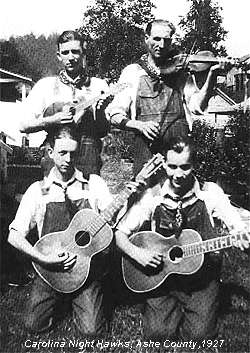 The Ridge Runners recorded two selections that day: the old mountain love song Nobody's Darling, and Be Kind to a Man When He's Down, a 'proverb' song of the 19th century, performances distinguished by Elmer Elliott's soulful fiddling and taut vocal delivery.
The Ridge Runners recorded two selections that day: the old mountain love song Nobody's Darling, and Be Kind to a Man When He's Down, a 'proverb' song of the 19th century, performances distinguished by Elmer Elliott's soulful fiddling and taut vocal delivery.
The same day marked the recording debut of a third band from Ashe County known as the Carolina Night Hawks, who arrived in Atlanta prepared with an original song promoting the Candidacy of New York governor Al Smith in the upcoming 1928 presidential election. Smith was the leading contender for the Democratic nomination, and advocated the repeal of Prohibition. The song, entitled simply Governor Al Smith for President, was penned by the group's banjoist Donald Thompson, and sung in a high tenor by mandolinist Ted Bare to the tune of White House Blues. Providing the instrumental lead was 15-year-old Howard Miller on fiddle, backed on guitar by his father, Charles Miller. Charles, born in 1887 along Stagg Creek near Comet, North Carolina, had learned to play fiddle from his father, Monroe Miller. By the mid-1920s, the Millers had teamed with Ted Bare, playing for box suppers and square dances throughout the Lost Provinces. In 1927 they were joined by Donald Thompson, a schoolteacher and talented songwriter from Laurel Springs, who played both fiddle and banjo.
Of the four songs recorded by the Night Hawks, only Thompson's composition was issued by Columbia, released in time to exploit Al Smith's wave of popularity. Donald Thompson later recalled the recording session:
We went in a Buick and they paid all expenses. We got to Atlanta and went right to the studio building. We didn't know anything about recording, never even seen a studio. A fellow meet us and took us to a room and said we could start practicing, so we did. Finally the guy came back and took us into the studio. There was a whole jug of whiskey sitting there, and he said, "Do you all want a nip?"Donald Thompson's home place in Laurel Springs was near the borderline dividing Ashe and Alleghany Counties, an area rich in musical talent. In the town of Furches, which straddled the county line, lived Ephraim Woodie, a singer and guitarist who grew up listening to the old Anglo-Saxon ballads sung by his mother, Lacuna. Born in 1907, Woodie was afflicted with cataracts and spent much of his childhood at the state school for the blind in Raleigh. After a series of operations improved his eyesight, he returned home in 1927 and formed a stringband with two older neighbors: Edison Nuckolls who played banjo, and fiddler Clay Reed.Well, Ted took a nip, but the rest of us didn't. Ted took a little but not enough to hurt him. Then Ted, Howard, and Mr. Miller got up close to the microphone, and they put me about eight feet behind. That banjo was loud, you know. Then they said, "Now you watch the light. When the light comes on, you start."
So we watched, and when it came on we just started and went straight on through and never made an error. We never had to repeat a single song. I wasn't a bit nervous when we went in there, and the rest weren't either. Old Ted just went right into it!
After we got back home, they sent us checks. They paid us around $100 apiece and expenses and all that. We had to eat, you know. They paid that too. We had a good time!
I was a Democrat then, I'm a Democrat now! Dyed in the wool! I was hoping our record would help Al Smith, but I don't think it ever got far enough along to help him much. He got defeated. Even so, I think we did a pretty good job on our record. When we finished recording, they played it back to us, and it sounded mighty good.
Nuckolls, whose wife and children all played music, operated a sawmill near Furches and raised corn and tobacco. Reed, also a farmer, grew up in Laurel Springs and had played music with Donald Thompson since childhood. Ephraim was still a bachelor at the time, and poked fun at his married companions when he named his band Ephraim Woodie and the Henpecked Husbands. The trio soon became popular at local social events and printed up handbills announcing:
In the fall of 1929 the Columbia Phonograph Company set up a field studio in Johnson City, Tennessee, and solicited local musicians to audition. On October 24, Ephraim Woodie and the Henpecked Husbands recorded two selections:WE PLAY BANJO, VIOLIN, GUITAR Singers of old time songs As "Cluck Old Hen," As well as love songs. we also have yodeling with part of the songs if that's the kind you like we'll furnish you all we know if you want that much it takes 4 to 6 hours to play all we know.
Come Bring All Your Friends and SWEETHEARTS
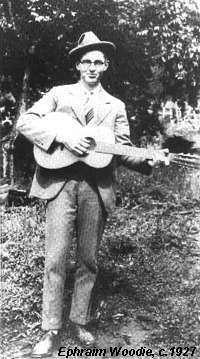 Last Gold Dollar, a wistful love song; and The Fatal Courtship, a ballad of heartbreak and suicide that dates back to 15th century England, and probably one that Ephraim learned from his mother. The trio rendered these songs with appropriate melancholy, marked by Woodie's excellent singing and it is unfortunate that the band had no further opportunities to make records. Soon after the recording session, Edison Nuckolls moved a few miles north to the community of Scottville and began playing music on a regular basis with guitarist Charlie Cox and fiddler Bill Williams, an alliance that would continue into the 1960s.
Last Gold Dollar, a wistful love song; and The Fatal Courtship, a ballad of heartbreak and suicide that dates back to 15th century England, and probably one that Ephraim learned from his mother. The trio rendered these songs with appropriate melancholy, marked by Woodie's excellent singing and it is unfortunate that the band had no further opportunities to make records. Soon after the recording session, Edison Nuckolls moved a few miles north to the community of Scottville and began playing music on a regular basis with guitarist Charlie Cox and fiddler Bill Williams, an alliance that would continue into the 1960s.
Ephraim Woodie did record once more, this time with his older brother Lawton Woodie. Lawton, born near Furches in 1900, was a schoolteacher who loved to play traditional mountain tunes on his French harp. In 19130 he presented Ephraim with a new Gibson L-4 guitar, a gift for his high school graduation. In the spring of 1931, Lawton heard that Victor was holding sessions in Charlotte, North Carolina, and wrote the company to arrange a recording date. On May 29th, the Woodie Brothers arrived in Charlotte with two songs they had written especially for the occasion. Likes Likker Better than Me, the lament of a whiskey drinker's wife, featured Ephraim's mountain tenor complemented by his brother's rich bass harmonies. Their second selection was called Chased Old Satan Through the Door, a composite that borrowed motifs from several songs, including Satan's A Liar and Shortenin' Bread.
Like most musicians from the Lost Provinces, the Woodies never made music a full time pursuit. Lawton continued his career in education and Ephraim became a storekeeper. Music in the Lost Provinces remained an important social activity, but entertainers with professional ambitions found it necessary to leave in order to achieve even nominal commercial success. As noted earlier, Banmon Grayson left Ashe County for Laurel Bloomery, Tennessee, a very short move in miles, but one that gave him easier access to the Lee Highway, an important road that connected towns all along the Blue Ridge. Grayson's travels brought him in contact with other professional musicians such as Tom Ashley, Dock Walsh, and eventually Henry Whitter. A verse from Grayson's I've Always Been a Rambler is relevant:
I left old North Carolina. to Marion I did go,During the Depression, money and work were not plentiful, but a town such as Marion, in Smyth County, Virginia, promised greater opportunities than the farming communities of the Lost Provinces. In 1929, Frank and Edd Blevins moved to Marion, found jobs at a furniture manufacturing plant and continued their musical activities as well. Frank Blevins was soon 'discovered' by folklorist Annabel Morris Buchanan and became a featured performer at the White Top Folk festival, first organized by Buchanan in 1931.
Went on to Johnson City, gonna see this wide world o'er,
Where money and work was plentiful, and the girls treated me kind,
The only object of my heart was the one I left behind.
The Blevins brothers also found radio work, broadcasting their music over WEHC in Emory, Virginia and WHIS in Bluefield, West Virginia. In 1934, they participated in a program of folk music broadcast by WRVA in Richmond, with hookups to NBC Radio affiliates across the United States and Great Britain.
Other musicians from the Lost Provinces were migrating to points north in search of greater economic opportunity and musical exposure. In the mid-1930s, Elmer Elliott moved to southeast Pennsylvania, joining other Ashe County musicians who had settled in the area, including Arthur Wood, Lester Miller, and Ola Belle Campbell. With these musicians at its core, the North Carolina Ridge Runners experienced a rebirth, with regular radio broadcasts that earned them a faithful following in Pennsylvania, Maryland and Delaware. The Ridge Runners became popular entertainers at newly-formed music parks throughout the area, most notably Sunset Park in West Grove, Pennsylvania, where they continued to perform, in various formations, for nearly two decades.
One of the most talented instrumentalists with roots in the Lost Provinces was banjoist Jack Reedy. Though no birth records survive, he was probably born around 1895 in Grassy Creek, North Carolina, a community in northeast Ashe County next to the Virginia line. Reedy resided much of his adult life at Seven Mile Ford in Smyth County, Virginia, only a few miles from Marion. 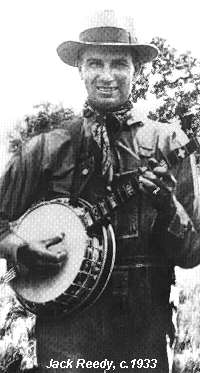 In 1927, Reedy was recruited to perform with The Hill Billies, an acclaimed group of professional country musicians organized by singer Al Hopkins. Hopkins was part of a musically gifted family from Gap Creek, North Carolina, in southern Ashe County. Although the Lost Provinces provided Hopkins' musical background, much of his upbringing occurred in Washington DC, where he developed a keen knowledge of the entertainment business. The Hill Billies' success as vaudeville performers and recording artists was largely due to Al Hopkins' entrepreneurial skills and his ability to recognize and recruit top talent, such as fiddler Elvis 'Tony' Alderman of Carroll County, Virginia, and ace Tennessee fiddler Charlie Bowman. In May of 1927, the group traveled to New York City to make recordings for the Brunswick and Vocalion labels, including a fine rendition of Cluck Old Hen, a tune that would become Jack Reedy's signature piece. The record showcased Reedy's skilful finger picking and the twin fiddles of Alderman and Bowman, with Al Hopkins providing vocals and Al's brother John Hopkins on ukulele.
In 1927, Reedy was recruited to perform with The Hill Billies, an acclaimed group of professional country musicians organized by singer Al Hopkins. Hopkins was part of a musically gifted family from Gap Creek, North Carolina, in southern Ashe County. Although the Lost Provinces provided Hopkins' musical background, much of his upbringing occurred in Washington DC, where he developed a keen knowledge of the entertainment business. The Hill Billies' success as vaudeville performers and recording artists was largely due to Al Hopkins' entrepreneurial skills and his ability to recognize and recruit top talent, such as fiddler Elvis 'Tony' Alderman of Carroll County, Virginia, and ace Tennessee fiddler Charlie Bowman. In May of 1927, the group traveled to New York City to make recordings for the Brunswick and Vocalion labels, including a fine rendition of Cluck Old Hen, a tune that would become Jack Reedy's signature piece. The record showcased Reedy's skilful finger picking and the twin fiddles of Alderman and Bowman, with Al Hopkins providing vocals and Al's brother John Hopkins on ukulele.
In 1928, Jack Reedy got a chance to make his own record for Brunswick, and he put together a band of seasoned musicians for the occasion. Jack Reedy and His Walker Mountain String Band included Frank Wilson on steel guitar, Fred Roe on fiddle, Fred's brother Henry Roe on guitar and of course Reedy playing banjo. Rounding out the group was guitarist Walter 'Sparkplug' Hughes from Damascus, Virginia. The Roe brothers lived near Bristol, Tennessee, and Frank Wilson came from Charlotte, North Carolina. The band assembled in Ashland, Kentucky, in mid-February at Brunswick's provisional studio and recorded two selections: the traditional square dance tune Chinese Breakdown, complete with hot instrumental breaks; and Ground Hog, a humorous mountain song commonly played on banjo. 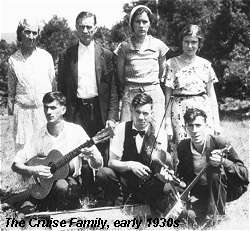 Although the Walker Mountain String Band displayed a sense of show business far removed from the introspective music of the Lost Provinces, they nevertheless chose old-time numbers that Reedy may well have learned as a child playing his first banjo, a homemade instrument made from a ground hog's hide stretched over the rim of an old ash sieve.
Although the Walker Mountain String Band displayed a sense of show business far removed from the introspective music of the Lost Provinces, they nevertheless chose old-time numbers that Reedy may well have learned as a child playing his first banjo, a homemade instrument made from a ground hog's hide stretched over the rim of an old ash sieve.
Reedy's next recordings were made in Bristol, Tennessee, for the Victor Company in the fall of 1928. This time he teamed with two veteran Bristol musicians, fiddler Jack Pierce and guitarist Malcolm Warley. Joining them was guitarist Carl Cruise of Damascus, Virginia, who came from a talented family of ballad singers, dancers and instrumentalists. Acknowledging Reedy's long-time home place, the band took as its name the Smyth County Ramblers. On October 27th, they entered the studio and performed My Name is Ticklish Reuben, an old comic song, and Way Down in Alabama, a song later recorded by The Carter Family as No More the Moon Shines on Lorena. Both performances contrasted Pierce's smooth fiddling with vocals that might be described as 'ragged but right'.
Jack Reedy joined forces with Frank and Edd Blevins soon after the brothers moved to Smyth County in 1929, forming a band that would last many years, though regrettably the trio never made records together. In 1933 they won top honors at the White Top Folk Festival, and performed in a special program for visiting First Lady Eleanor Roosevelt, amidst a flood of publicity Paramount Newsreel footage, now lost, captured the Reedy-Blevins Band performing Johnson's Old Gray Mule and Cluck Old Hen as Mrs Roosevelt looked on. The group expanded in 1934 with the addition of guitarist Corwin Matthews, dubbing themselves the Southern Buccaneers. Led by Frank Blevins, the Southern Buccaneers reigned as the foremost stringband in southwest Virginia throughout the remaining 1930s, displaying a diversity that included popular country songs, harmony vocals, yodeling, dancing and comedy. 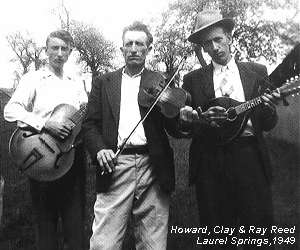 But the Buccaneers never forgot their musical roots, and each show also featured a set of old-time mountain fiddle tunes.
But the Buccaneers never forgot their musical roots, and each show also featured a set of old-time mountain fiddle tunes.
In spite of the professional accomplishments of Ashe County expatriots, music from the Lost Provinces remained primarily a homespun pursuit. It was a social music that celebrated local events and provided diversion from hard work, a music that created bonds between neighbors and served as a link from one generation to the next. It was the music of Clay Reed, Donald Thompson, Ephraim Woodie, and the others who stayed in the region, men who played music for the sheer love of playing music. Their names are not famous and the records they made were never hits, yet their music represents a tradition that continues still. Today there are square dances, fiddling contests, old-time radio shows, and back porch picking sessions throughout those counties once known as the Lost Provinces, where old folks still speak fondly of Banmon Grayson, and young fiddlers still learn his tunes.
Music from the lost Provinces endures, as listening to these songs of seven decades past makes abundantly clear.
Marshall Wyatt - 1997
Article MT031
This article appeared first in 1997 as the booklet notes to the CD, Music from the Lost Provinces, published by Old Hat Enterprises, PO Box 10309, Raleigh, North Carolina 27605, USA. It is reprinted here with the permission of its author and Old Hat boss, Marshall Wyatt. (This record label has no connection with the English label Old Hat Music, associated with Veteran Tapes of Suffolk, UK)
The CD is available from the following US mail-order sources:
| Top of page | Home Page | Articles | Reviews | News | Map |